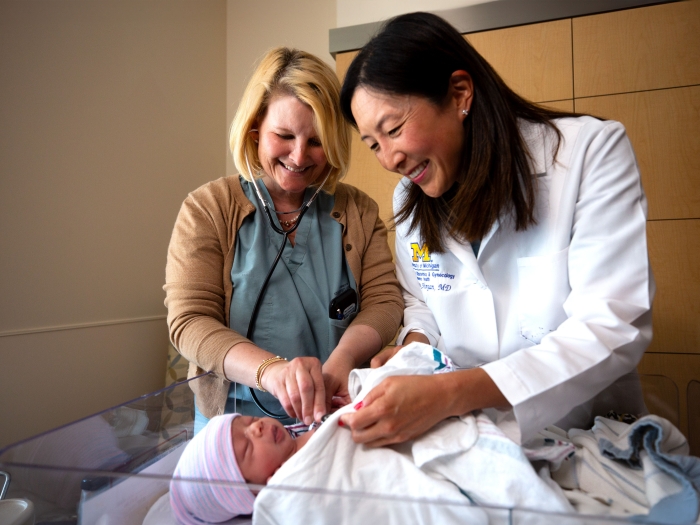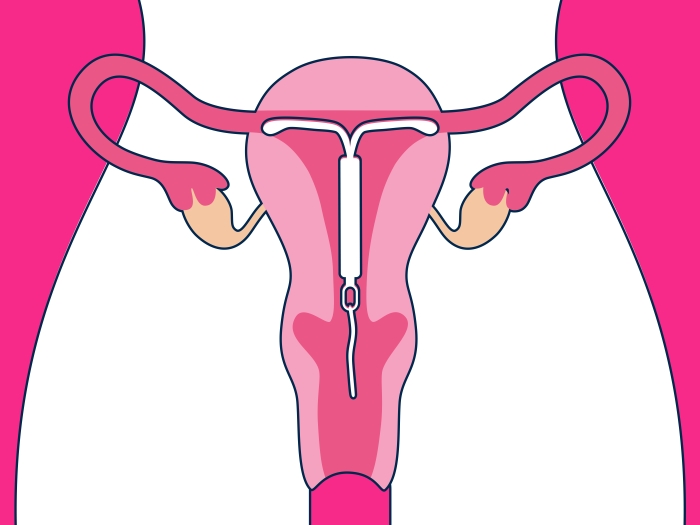Newborn drug testing inequities remained similar after recreational legalization of cannabis, overall test positivity rates for THC increased
11:00 AM
Author |

If a newborn tests positive for certain drugs after birth, mandated reporters in many states – including health care professionals and social workers – are required to report it to Child Protective Services.
But guidelines on what should trigger these tests are often unclear and inconsistent, which studies have shown may contribute to racial inequities in who gets tested.
Residents, faculty, medical students and researchers at Michigan Medicine’s Department of Family Medicine and Antiracism and Health Equity Program wanted to determine rates of newborn drug testing and if these rates varied by race and ethnicity of birth parents.
The team also wanted to explore if newborn drug testing patterns changed after recreational cannabis was legalized in Michigan in 2018.
Their findings, which appear in JAMA Network Open, expand on previous research suggesting that Black newborns are more likely to be screened for prenatal drug exposure compared to other racial and ethnic groups, even in the absence of risk factors for substance use disorders.
Racial inequities in newborn drug testing rates persisted during the seven-year study period before and after the cannabis law change. Among tests that did detect newborn drug exposure, the most commonly identified substance was tetrahydrocannabinol, or THC, the active chemical in cannabis.
“In the absence of a newborn drug screening policy, we saw inconsistencies in how and when clinicians ordered drug tests for newborns at low risk of prenatal drug exposure,” said senior author Lauren Oshman, M.D. M.P.H, associate professor of family medicine at the University of Michigan Medical School. “We measured drug testing rates before and after cannabis legalization to see if the change in law improved or worsened these inequities and found it didn’t appear to make any difference.”
Researchers analyzed data from 26,366 births between 2014-2020 at University of Michigan Health, comparing drug testing rates by racial and ethnic groups and test results before and after recreational marijuana use became legal in the state in 2018.
Newborns born to white parents were 24% less likely to receive a drug test than those in Black families, according to the study, but were more likely to have a drug test positive for opioids.
This suggests undertesting of white newborns and potentially missed opportunities to detect and treat opioid use disorder, authors say.
Michigan Medicine has since implemented a new policy to help clinicians determine whether a drug test is warranted. New criteria include a baby showing symptoms of withdrawal or, if at the time of birth, a birthing person answers “yes” to the question of whether they’d used drugs during pregnancy.
Previously, the decision to order a newborn drug test was left up to the judgment of clinicians. Implementing a standardized policy is just the first step, authors say, noting that the hospital will be tracking data every month to gauge whether the changes are having a positive impact.
“It is incumbent upon medical institutions to identify racial inequities that occur as a result of their policies, or lack thereof, and processes. We can’t change what we don’t measure,” said study coauthor Justine Wu, M.D., M,P.H., an assistant professor of family medicine at the U-M Medical School.
“We can’t move forward without self-reflection to stop practices that perpetuate structural and obstetrical racism, followed by thoughtful, community-engaged solutions to promote health equity.”
Positive newborn drug tests for THC increased across all racial and ethnic groups after its legalization, the study suggests, up from 50% to 69%. About two in five newborn drug tests were positive only for THC, with Black newborns more likely to have a positive test than white newborns.
This rise, Oshman says, reflects national trends in cannabis use increasing in pregnancy, with up to 12% of people reporting use in the first trimester in 2016 to 2017.
Despite a lack of studies demonstrating that cannabis use in pregnancy increases the risk of child abuse or neglect, authors note, state law mandates a CPS report for a newborn drug test positive for THC because recreational cannabis remains a federally controlled substance.
Meanwhile, the same isn’t true for prenatal exposure to nicotine, they point out, which has been shown to contribute to poorer health outcomes in babies.
“Punitive policies that link prenatal substance exposure to newborn drug testing may lead to disproportionate criminalization and policing of Black parents and families,” Oshman said. “We need policy changes at state, community and hospital levels to reduce health inequity and improve measures focused on the health, well-being, and dignity of Black birthing people and their newborns.”
Less than 6% of newborns overall tested positive for amphetamine, cocaine, methamphetamine, and phencyclidine, researchers found.
The policy change at Michigan Medicine dovetails with other institutional efforts to address inequities, including medical teams devoted to ongoing implicit bias training and anti-racism research. The Partnering for the Future clinic at U-M Health Von Voigtlander Women’s Hospital, also focuses on treating substance use disorders during pregnancy.
Michigan researchers have partnered with other stakeholders as well, including advocacy and community groups, to address statewide policy improvements.
“Our leaders, doctors, researchers, nurses and staff are all committed to reducing biases in the health system that may lead to inequitable applications of laws and negatively impact treatment and care,” Oshman said. “We hope this type of research helps other health systems explore how their policies or state policies may influence inequities affecting patient care and outcomes.”
This study was funded by the University of Michigan Office of the Vice President of Research and the National Center for Institutional Diversity.
Additional authors include Sebastian Schoneich, M.D., Melissa Plegue, M.A., Paul Chandanabhumma, Ph.D., M.P.H.; Carol Shetty, M.D.; and Christopher Frank, M.D., Ph.D., all of U-M; Victoria Waidley, M.D., of the University of California San Diego, and Katharine McCabe, Ph.D., of the University of Notre Dame.
Study cited: Incidence of Newborn Drug Testing and Variations by Birthing Parent race and Ethnicity Before and After Recreational Cannabis Legalization,” JAMA Network Open. DOI: 10.1001/jamanetworkopen.2023.2058

Explore a variety of health care news & stories by visiting the Health Lab home page for more articles.

Department of Communication at Michigan Medicine
Want top health & research news weekly? Sign up for Health Lab’s newsletters today!





